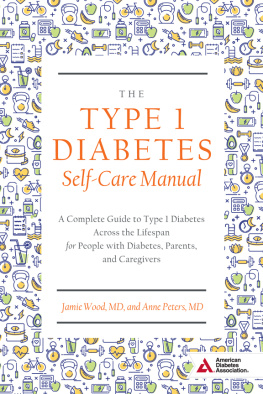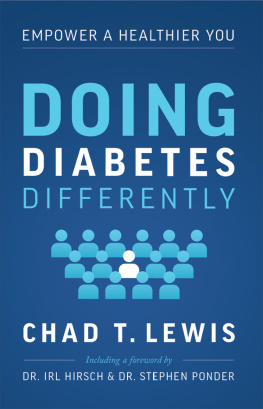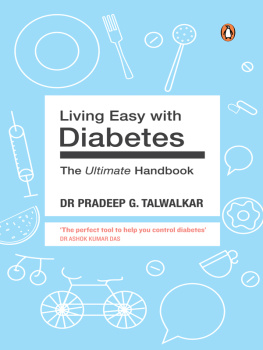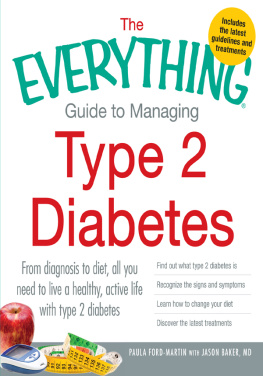
Director, Book Publishing, Robert Anthony; Managing Editor, Book Publishing, Abe Ogden; Production Manager, Melissa Sprott; Cover Design, Jody Billert; Printer, United Graphics Inc.
2009 by the American Diabetes Association, Inc. All Rights Reserved. No part of this publication may be reproduced or transmitted in any form or by any means, electronic or mechanical, including duplication, recording, or any information storage and retrieval system, without the prior written permission of the American Diabetes Association.
Printed in the United States of America
1 3 5 7 9 10 8 6 4 2
The suggestions and information contained in this publication are generally consistent with the Clinical Practice Recommendations and other policies of the American Diabetes Association, but they do not represent the policy or position of the Association or any of its boards or committees. Reasonable steps have been taken to ensure the accuracy of the information presented. However, the American Diabetes Association cannot ensure the safety or efficacy of any product or service described in this publication. Individuals are advised to consult a physician or other appropriate health care professional before undertaking any diet or exercise program or taking any medication referred to in this publication. Professionals must use and apply their own professional judgment, experience, and training and should not rely solely on the information contained in this publication before prescribing any diet, exercise, or medication. The American Diabetes Associationits officers, directors, employees, volunteers, and membersassumes no responsibility or liability for personal or other injury, loss, or damage that may result from the suggestions or information in this publication.
 The paper in this publication meets the requirements of the ANSI Standard Z39.48-1992 (permanence of paper).
The paper in this publication meets the requirements of the ANSI Standard Z39.48-1992 (permanence of paper).
ADA titles may be purchased for business or promotional use or for special sales. To purchase more than 50 copies of this book at a discount, or for custom editions of this book with your logo, contact the American Diabetes Association at the address below, at booksales@diabetes.org, or by calling 703-299-2046.
American Diabetes Association
1701 North Beauregard Street
Alexandria, Virginia 22311
Library of Congress Cataloging-in-Publication Data
Stanley, Kathleen, 1963
50 things you need to know about your diabetes careright now! / by Kathleen Stanley.
p. cm.
ISBN 978-1-58040-283-5 (alk. paper)
eISBN 978-1-58040-387-0
1. DiabetesPopular works. I. Title. II. Title: Fifty things you need to know about your diabetes careright now!
RC660.4.S73 2009
616.462dc22
2009005564
eISBN: 9781580403870
To George, Alex, and Steve with love.
Thanks to my furry, supportive companions, Coco (now departed) and Frankie, who kept me company many late hours to complete this project.
CONTENTS
As diabetes care has advanced over the years with new gadgets, tools, and methods, one principle has remained the same: Education is the key to successful diabetes self-care and optimal health. The new, little bright-colored meters are cool, and insulin delivery devices (pumps and pods) are sophisticated, but if you dont know how to solve problems for yourself, these tools can only help so much.
Diabetes education can come from formal training with a health care professionala physician, certified diabetes educator (CDE), nurse, registered dietitian (RD), or pharmacistand from informal experiences in life. Qualified health care professionals can teach basic self-care strategies and provide useful information. But real life situations, such as eating out at a restaurant for the first time after being diagnosed, will test your ability to apply your knowledge to different settings and situations. There are challenges to face daily, and some are easier to conquer than others.
The goal of this book is to help make a link between the skills you learn from health care professionals and the real-life situations you will face. The intent of the book is not to replace diabetes education classes, as you need to have a basic understanding of diabetes and a basic set of skills. Learning how to test your blood glucose, develop a meal plan, or take medications are best learned in a formal setting with hands-on instruction. But your body will also teach you how it works and responds to situations, which may vary slightly from the theory you learned in class, or even in this book. You will need to develop your own unique strategies and solutions for certain circumstances along the way at times.
Diabetes care is constantly evolving and improving. New products are developed each year that can directly improve your quality of life, and you will want to be in the know about these new products. You will also learn to modify your own management strategies when an outcome wasnt what you expected or planned for. Sometimes in diabetes, you have to make an educated guess to predict what will happen to your blood glucose in a situation. Your personal blood glucose monitor device is an indispensable tool to use to help you collect information about outcomes and learn from past unexpected situations to face the new ones.
Finally, be open to making changes in your own care as you live with diabetes. Your body will go through natural changes each year, and these changes will require adjustments on your part. Use resources, such as your personal health care team and information from the American Diabetes Association (ADA), to help you make informed decisions about your health. Share any successful tips you have learned with others who live with diabetes, too. Imparting strategies and ideas you have learned to others can help you build a support network and improve your own knowledge. Isnt it often said that teachers learn more from their students than the other way around?
The truth is that you will be a lifelong student in the subject of diabetes. But it will be a journey that is worthwhile. My hope is that this book can help. In the following pages, I provide useful tips derived from professional experts, as well as real life people. The result is the first 50 Things you should know about diabetes.
Kathleen Stanley, CDE, RD, LD, CN, MSEd, BC-ADM
FINDING YOUR DOCTOR
Diabetes is a lifelong disease, so choosing a good doctor to take care of your diabetes will be a long-term decision. Think about other relationships you have established for your business or in your personal life. More than likely, good communication and trust are largely responsible for the successful relationships you have had. You will be working together with a doctor for years, so choose carefully, and expect to build the relationship over time, not just at the first visit. The following tips should help you in this important search.
GET PROFESSIONAL ADVICE
Ask your favorite current health care provider (family doctor, dentist, ophthalmologist) to recommend someone. If you like this providers professional style, chances are, they will recommend someone who uses a similar style.
DO SOME SCOUTING BEFOREHAND
Some physician offices and clinics have marketing packets or office information packets that could be mailed to you. The web is also an excellent resource. Many insurance companies, hospitals, and even municipal websites offer online physician finders. Many doctors and clinics also have their own website with information on credentials, services, and insurance policies.
Next page















 The paper in this publication meets the requirements of the ANSI Standard Z39.48-1992 (permanence of paper).
The paper in this publication meets the requirements of the ANSI Standard Z39.48-1992 (permanence of paper).